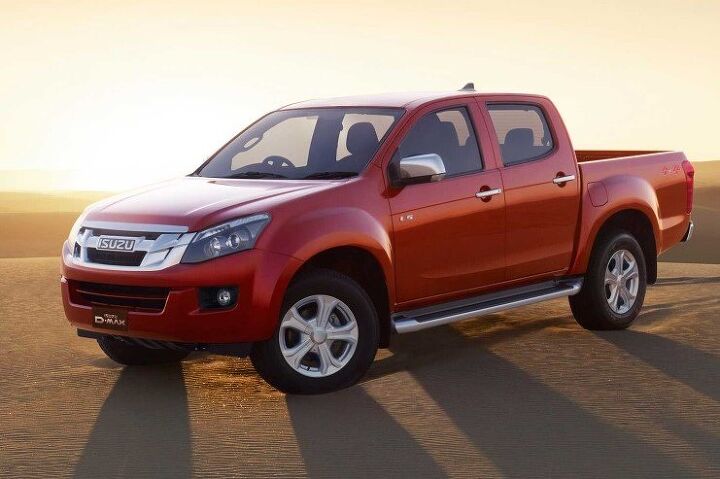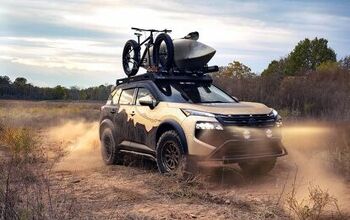Isuzu to GM: 'It's Been Grand, But I'm Dating Someone Else Now' [UPDATE]

Update: Automotive News is reporting General Motors is now focusing “on the higher end of the market while the Japanese firm sticks to selling vehicles for everyday commercial purposes,” strongly hinting that GM is the one that broke off the collaboration. We’ve added detail below.
After announcing a new bromance with Mazda just over a week ago, Isuzu is calling it quits with its old beau General Motors.
(Or maybe GM caught Isuzu cheating behind its back. Who knows? The relationship dynamics at play between automakers are difficult to flesh out.)
Regardless, midsize trucks — badged as both Isuzus and Chevrolets — will be no more in the Land of Smiles. The duo, which has a truck plant each in Thailand, will decouple their R&D efforts as they move toward engineering new global midsize pickups.
As part of the previous announcement, Mazda ended one of its last ties with former parent Ford. The Japanese company will instead work with Isuzu on its next BT pickup, which will become a rebadged version of the Isuzu D-Max. Since Isuzu now has a new willing partner in Mazda, the automaker that once gave GM all its LUV is parting ways with Detroit in the global pickup segment after more than a decade working together. The current Isuzu D-Max provides the basis for the global Chevrolet Colorado, which is structurally different from the one Chevrolet sells in North America.
“After detailed discussions with GM, we have agreed that we will continue pickup truck development on our own,” Isuzu said in statement, reported by Automotive News.
“Both GM and Isuzu agree that due to unique requirements for each company, joint development of the next-generation midsize pickup truck for GMI markets is no longer the optimal model for this project,” GM said in today’s statement.
From AN:
One GM executive said the “unique requirements” for GM are about the strategic shift it began making last year in Southeast Asia where it is now trying to focus more on competing in the higher end of the region’s truck and SUV markets.
Despite the obvious benefits of collaborating on development such as sharing costs, the executive, who declined to be named because he is not authorized to discuss the move, said that GM had decided not to try to copy its Japanese rivals in Southeast Asia where brands like Isuzu, Toyota Motor Corp. and Mitsubishi Motors Corp. dominate.
“It doesn’t make sense for us trying to copy the business strategy of the Japanese rivals in Southeast Asia,” the executive said.
Domestically, Isuzu and GM announced they’d be working together to launch GM back into the medium-duty market with a new line of cabover trucks. Six new models will be available in the U.S. – Chevrolet 3500, 3500HD, 4500, 4500HD, 5500 and 5500 HD – all based on the Isuzu N-Series.
The change in Japan’s pickup strategy leaves GM and Ford to fend on their own outside of North America — unless they can figure out a way to work together.
[Image: Isuzu]

More by Mark Stevenson
Latest Car Reviews
Read moreLatest Product Reviews
Read moreRecent Comments
- Redapple2 Good luck to them. They used to make great cars. 510. 240Z, Sentra SE-R. Maxima. Frontier.
- Joe65688619 Under Ghosn they went through the same short-term bottom-line thinking that GM did in the 80s/90s, and they have not recovered say, to their heyday in the 50s and 60s in terms of market share and innovation. Poor design decisions (a CVT in their front-wheel drive "4-Door Sports Car", model overlap in a poorly performing segment (they never needed the Altima AND the Maxima...what they needed was one vehicle with different drivetrain, including hybrid, to compete with the Accord/Camry, and decontenting their vehicles: My 2012 QX56 (I know, not a Nissan, but the same holds for the Armada) had power rear windows in the cargo area that could vent, a glass hatch on the back door that could be opened separate from the whole liftgate (in such a tall vehicle, kinda essential if you have it in a garage and want to load the trunk without having to open the garage door to make room for the lift gate), a nice driver's side folding armrest, and a few other quality-of-life details absent from my 2018 QX80. In a competitive market this attention to detai is can be the differentiator that sell cars. Now they are caught in the middle of the market, competing more with Hyundai and Kia and selling discounted vehicles near the same price points, but losing money on them. They invested also invested a lot in niche platforms. The Leaf was one of the first full EVs, but never really evolved. They misjudged the market - luxury EVs are selling, small budget models not so much. Variable compression engines offering little in terms of real-world power or tech, let a lot of complexity that is leading to higher failure rates. Aside from the Z and GT-R (low volume models), not much forced induction (whether your a fan or not, look at what Honda did with the CR-V and Acura RDX - same chassis, slap a turbo on it, make it nicer inside, and now you can sell it as a semi-premium brand with higher markup). That said, I do believe they retain the technical and engineering capability to do far better. About time management realized they need to make smarter investments and understand their markets better.
- Kwik_Shift_Pro4X Off-road fluff on vehicles that should not be off road needs to die.
- Kwik_Shift_Pro4X Saw this posted on social media; “Just bought a 2023 Tundra with the 14" screen. Let my son borrow it for the afternoon, he connected his phone to listen to his iTunes.The next day my insurance company raised my rates and added my son to my policy. The email said that a private company showed that my son drove the vehicle. He already had his own vehicle that he was insuring.My insurance company demanded he give all his insurance info and some private info for proof. He declined for privacy reasons and my insurance cancelled my policy.These new vehicles with their tech are on condition that we give up our privacy to enter their world. It's not worth it people.”
- TheEndlessEnigma Poor planning here, dropping a Vinfast dealer in Pensacola FL is just not going to work. I love Pensacola and that part of the Gulf Coast, but that area is by no means an EV adoption demographic.


































Comments
Join the conversation
I would say that the Isuzu and Mitsubishi COE trucks must work for many businesses or they would not buy them. I do not think having a long hood would work as well for delivery trucks in urban areas with tighter parking. If these trucks did not serve a purpose then no one would buy them. As for midsize versus compact trucks Government standards have basically made a true compact truck a harder sell for the manufacturers. A smaller truck would be subject to the same efficiency standards as a compact car which while not being fair it is what it is. The current midsize trucks are not subject to as strict a standards. At the present time a compromise to a midsize truck is more doable than a full size half ton truck for those wanting a smaller truck. If in the future a full size half ton is reduced slightly in size then a midsize truck will no longer be viable. It is possible to reduce the length of full size pickups if these trucks are made of lighter materials and if most have smaller engines.
"Regardless, midsize trucks — badged as both Isuzus and Chevrolets — will be no more in the Land of Smiles. The duo, which has a truck plant each in Thailand, will decouple their R&D efforts as they move toward engineering new global midsize pickups." ? Nope. Both GM and Isuzu will continue to build and sell pick ups in Thailand. "The current Isuzu D-Max provides the basis for the global Chevrolet Colorado" Wrong again. The bodyshell of the D-Max was designed by GM at their Buena Vista studios, and it is in fact the _previous_ model Colorado.